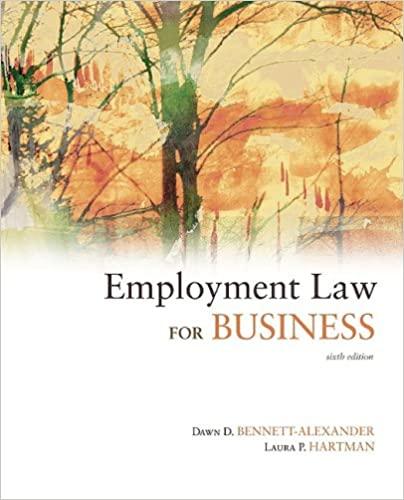Question
Problem Question for contract law doctrine of frustration, can you please provide me some guidelines on the framework of my answer? thanks so much Scenario:
Problem Question for contract law doctrine of frustration, can you please provide me some guidelines on the framework of my answer? thanks so much
Scenario:
In January 2009, the government of Ruritania invited tenders for the construction and operation of a theme park in its capital, Viana. Hong Kong Land Management Ltd (HKLM) became very interested in the project but as it had little expertise in the construction or operation of theme parks, it sought a partner with greater expertise so as to improve its chances of winning the tender. After negotiating with a number of different companies, HKLM entered into an agreement with Water World (HK) Ltd (WWHK) to put in a joint bid for the project.
Under the terms of the agreement, HKLM was to supply the initial capital required for the project (some HK$1 billion), which included the cost of purchasing the lease of land, and construction costs. WWHK, in turn, were expected to supply their expertise in the design and construction phases of the project. In return for their services, WWHK were to be paid a sum of HK$10 million by the end of construction, which sum remains outstanding. (The market value of such services is estimated at HK$25 million and increased the book value of the theme park by some HK$100 million to HK$800 million).
After construction is completed (scheduled December 2011), WWHK were to manage the project solely for the first 5 years. During this period, profits (and ownership in the park) were to be shared between WWHK and HKLM in a 10%/90% ratio. Thereafter, HKLM were supposed to undertake 50% responsibility in the operation of the park, and profits (and ownership) shared equally for the remaining 45 years of the lease of the land.
For the first three years of the operation, the theme park turned a healthy profit of HK$50 million per year. WWHKs cost of managing the park was some HK$10 million per year, the market value of which, if independently engaged, would have amounted to some HK$15 million per year. In January 2015, the government of Ruritania was overthrown in a military coup detat and the new government imposed martial law and tourist arrivals plummeted drastically. During this period, WWHK continued to incur costs of HK$ 500,000 per month in operation costs but the park failed to turn any profits. Before January 2015, the value of the park was estimated at HK$900 million but as soon as the coup detat came to pass, its value fell to HK$500 million. By March 2015, it became clear that the new government of Ruritania was adopting a closed door policy to foreigners and visitors to the park were limited to the odd Ruritanian. By then, the value of the park fell to some HK$250 million.
By the end of March 2015, WWHK felt that operations could no longer be sustained and incurred expenses of some HK$2 million to terminate prematurely the contracts of all its staff as well as several long-term servicing contracts with various other contractors. Inmid-April 2015, the government of Ruritania declared that the land upon which the park was built was to be confiscated as a result of the immoral character of the enterprise its owners had permitted it to be used for, viz a theme park.
Question:
Advise the parties. For your purposes, assume that Hong Kong law governs the contract.
Step by Step Solution
There are 3 Steps involved in it
Step: 1

Get Instant Access to Expert-Tailored Solutions
See step-by-step solutions with expert insights and AI powered tools for academic success
Step: 2

Step: 3

Ace Your Homework with AI
Get the answers you need in no time with our AI-driven, step-by-step assistance
Get Started


